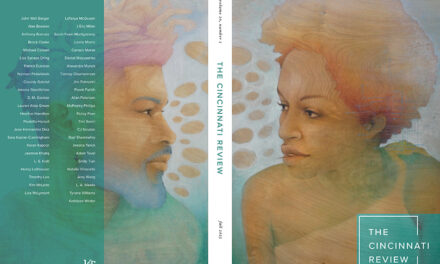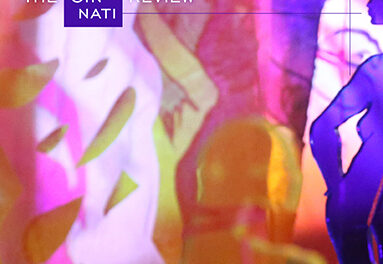We are pleased to share this review by Sonja Livingston of Judith Kitchen’s The Circus Train (Ovenbird Books, 2014), which appeared in Issue 18.2 as part of a special multigenre review feature on joy, hope, and delight (read the entire feature here).
Twenty years ago I sat with a dying friend in his hospital room. He’d experienced a degenerative disease for years and decided the time had come. It would take a few days for his body to let go. In the meantime his large Italian family crowded the hospital room, weeping and swapping stories. The assemblage of cousins and uncles and brothers gave way only when the priest we’d known since childhood arrived. Some went for a cup of coffee, others stepped outside for a cigarette and fresh air. I don’t remember why I stayed behind. I just remember folding myself into a corner of the large room as the priest stood near the bed speaking in hushed tones. When he left, my friend called me over.
“Sonja,” he asked, laughing. He was always laughing. “Was that Last Rites?”
I didn’t answer right away. I was unsure about the propriety of telling someone he’d received a final blessing; didn’t that mean the show was truly over? Beyond the question of etiquette, I was stunned by the realization that something as momentous as Last Rites—and even death itself—could succumb to the awkward and murky churn of the everyday. Shouldn’t such moments be situated outside the realm of the ordinary? In movies and art, these sorts of scenes are elevated and crystal clear. The camera zooms in. Violins are cued. A nimbus of light descends. All these years later, my friend’s blessing stands out for the granularity of its texture and how astonishingly ordinary even the most extraordinary moments can be.
Judith Kitchen’s wildly intelligent final collection, The Circus Train, hinges on the writer’s awareness that she is dying. Published in 2014, in the months before her death, these essays show that Kitchen is all too aware of the shocking incongruity of real time but refuses to be bound by it. Instead, the essayist turns largely to the past to contemplate questions of mortality, meaning, and loss. She’s specifically concerned with an image from early childhood: a train chugs through the valley in New York’s Southern Tier while five-year-old Kitchen sits in a strawberry patch watching the “blue and yellow and lavender cars following the tiny plume of smoke, rounding a bend, suddenly emerging from a string of trees, . . . pulling the animals and acrobats and jugglers from somewhere to somewhere else.”
Kitchen’s circus train winds its way through her prose as the writer gives herself to the past, and it’s worth noting that Kitchen’s chosen form—a segmented novella-length essay spanning 122 pages—parallels this central image. Like a series of brilliant boxcars strung together, each segment brims with color and movement as Kitchen slips from the near to distant past, shifts points of view, and moves associatively from one dazzling image to the next, all of which lends the writing the kaleidoscopic quality of an old-time circus on opening day.
Though Kitchen returns to her illness only occasionally, it is always there, providing a quiet but insistent backbeat to her extended meditation. The tension in The Circus Train, however, comes less from Kitchen’s terminal diagnosis than from the distance between the distilled past and the imperfect present, along with the staggering accretion of memory and the corresponding sense of just how quickly time passes. A given moment’s inability to reflect its own momentousness may explain why Kitchen is so interested in memory. By its very distillation, memory washes the debris away. The tedious, trivial, and inessential clutter are forgotten. In memory, as in art, we’re left with the emotional core.
But even memory is complicated. As Kitchen circles through space and time—landing in Scotland, Ireland, Brazil, western New York, Port Townsend—she realizes she could not have seen that circus train exactly as she remembers because there was no view of the valley from her strawberry patch. She’s conflated two memories or lifted the circus train from another source and fused it onto her memory of the strawberry patch.
The fallibility of memory does not derail Kitchen’s desire to pin it down. As Kitchen, clear-eyed and secular—perhaps even cynical—struggles with the mystery of the circus train, her belief that memory matters, that it is as wise as it is mysterious, grows more insistent. This provides the reader with hope that our own memories and the things of this life, however minor, are worthy of attention and reverence. “It must have meant something as it moved across my horizon and vanished into the haze,” she writes of the little train. “It must have meant something, because it keeps on trailing its scarf of smoke.”
The Circus Train is Judith Kitchen at her best. The extended title essay and two shorter essays accompanying it offer a view of a woman looking back at her life and simultaneously present an essential but often overlooked pioneer of the lyric essay at the height of her power. Kitchen’s sharp gaze travels over the images of a life while her poet’s ear luxuriates in the pleasures of language as she weaves a tapestry of geography, literature, relationships, and family.
Despite the exquisite feast of memory that is The Circus Train, the writer’s present provides the platform on which she stands to reach us. Not just the startling appreciation of the quotidian in which Kitchen revels despite the cancer—the hint of moon through the skylight, the graceful movements of the soccer player on TV, the sound of the foghorn in the distance—but the cancer itself which, however unlovely, provides the occasion for the writer to whisper into our ear. It’s the present-tense writer straddling life and death who lassoes the reader with the image of a little train from seventy years before; who asks “Is this all there is? This quick, spent cartridge?”; who looks out from the page, saying: “Whoever you are, I hope you are watching the world go past. Your world, and your inner world within it. . . . Everything persists, even as everything changes.”
By embodying the present, even as it speeds through time, The Circus Train illustrates that the moments we inhabit are, in fact, momentous. Ordinary time can be—if not always beautiful—at least true. And more than anything, Kitchen is devoted to truth. Just as she refuses the cotton-candy pink of breast cancer awareness or platitudes about bravery, she acknowledges that she isn’t sure how or whether all the moments add up and what they mean. But they do mean something (this extraordinary collection attests to that), and Kitchen is right there on the page the whole time, so close you can feel the soft chug of her breath as she discusses Beckett and Frost, the strum of rain on the window, or the circus train forever winding through the valley of her memory.
When all those years ago my friend called me over to ask what the priest had done, I was too astounded by the confusion about his final blessing to see that the actual blessing was in the utter authenticity and vulnerability of the question itself and the way we touched when I finally said, “I think so.”
So too is the blessing of Judith Kitchen’s final work. She is real with us until the end. Her revelations, in all their beauty, confusion, and longing, illustrate the delight and power of her beloved essay form while supporting the book’s unspoken but central conviction that our days do, in fact, add up to something. The significance of our lives and its most lasting joys are found in the truth and heft of the words we share.
Sonja Livingston is the author of four books of nonfiction. Her widely anthologized work has won an AWP Prize for Creative Nonfiction, a NYSCA/NYFA Fellowship, an Iowa Review Prize, a VanderMey Nonfiction Prize, and an Arts & Letters Prize for creative nonfiction. Sonja is an associate professor at Virginia Commonwealth University. More at sonjalivingston.com










